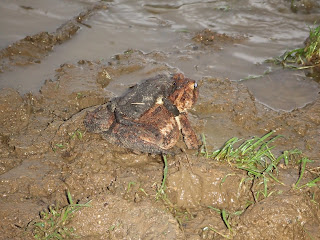We're just relaxing today after one hell of a Saturday. We had a huge plant sale yesterday down in Waynesville. The day started at around 3:30 a.m., and, aside from the car ride there, I didn't sit down again until around 5 p.m.; then my head didn't hit the pillow until around 11 or 12 last night. Yeah, it was busy. We sold lots of beautiful plants though, which will find cozy homes in the gardens of lots of folks. We hear from the media and see firsthand that gardening is on the increase this year. Which is great.
That quote is from
Aldo Leopold, one of the great forefathers of environmental ethics and ecology.
A Sand County Almanac is his masterwork, wherein he philosphically and beautifully documents a year of living on a small farm he reclaimed in south-central Wisconsin. Key to Leopold's work is his Land Ethic, which, in a nutshell, says humans need to face the undeniable fact that we are part of the natural world, not separate from it and, therefore, "A thing is right when it tends to preserve the integrity, stability, and beauty of the biotic community. It is wrong when it tends otherwise."
The book was written in the 40s. Leopold was worried then about Americans' tendency to focus so much on being "productive," rule-following, patriotic citizen-consumers, leaving the bulk of important decisions to "others," notably the government. In other words, Leopold felt that without direct, individual obligation--an ethical relationship--to the preservation of the land and everything on it, we could lose all that sustained our lives and made them worth living. An obligation without personal commitment and conscience is often an unfulfilled obligation.
Could it be that 60 years after
A Sand County Almanac was first published folks might be embracing the land ethic?
Yesterday I sold plants to people who have never gardened before. And I hope I sold them good, strong plants and gave them some useful tips. Because it might be that their livelihood--or at least their comfort--depends on our plants providing their family with some sustenance. Some people spent $50 on little vegetable and herb plants. That's 20+ plants. For their home garden. All these folks--and apparently they're out in record numbers all across the country--have decided to take a little bit more responsibility for their own existence, closing the door just a bit on the destruction caused by mechanized petrochemical agribusiness and government subsidies. They know (or will see soon) that viability springs from the soil, from other plants, from animals, from the sun, and from other people.
I don't know if people are doing this out of necessity, if they're being pragmatic, or if it's the start of a new era in this country. We'll see. But no matter the motivation, this year's gardeners/farmers (the two words can be interchanged in my opinion) will gain or solidify valuable skills for the necessity of the near future. 'Cause I don't think it will be long before people need to grow at least some of their own food. Same as it almost ever was.
From
The French Broad, by Wilma Dykeman:
It would be difficult to find a dozen people who have a family history in the French Broad country who don't count at least one farmer, and more likely several, among their ancestors. Even professional men by vocation were also farmers by necessity until recently, and savings were often deposited in lands rather than in banks.
[...]
In the rugged Tennessee county of Sevier, bordered by the Smoky Mountains and sliced by the Little Pigeon River, there were 1,071 heads of families listed in a census of 1850. Of these, all but 89 were designated farmers, with the exception of one or two candid souls who admittedly "did nothing." Of this eight percent of nonfarmers, blacksmiths (14), millers (11), and Baptist minsters (9) led the list. Half-a-dozen carpenters and wagon makers, five merchants, three each of physicians, tanners, shoemakers and horse traders, a brace of lawyers, coopers, Methodist ministers, hammermen and saddlers, and a single hatter, miner, wheelwright, navigator and cabinetmaker just about complete a fairly clear picture of the pre-Civil War life of that and many a neighboring county.
And I'd venture to guess it was like that in most of America a century-and-a-half ago. When I read those numbers, I was shocked, and proud of our ancestors; almost everyone was a small farmer, and many non-farmers provided people with the products and services they required to live a decent life. It's been like this on most of the planet for most of human history. People knew what it meant to work and survive. Most everyone possessed skills that mattered. And, in many cases, that direct, knowing dependence on the biotic community for one's livelihood automatically led to an ethical obligation to care for the land. That obligation slowly eroded; but maybe we've reached the valley.
Mainstream media and politicians at the federal level will probably not admit it until the very end, but the American lifestyle haphazardly erected during the past century or so is just about over. I don't know if I'd go as far as Jim Kunstler, who says that the demise of our deeply embedded irresponsible stuff-based culture will lead to a
"national psychotic breakdown" or that
"the current mood of public paralysis will dissolve in a blur of blood and spittle sometime between Memorial Day and July Fourth," but I like the way he tries to lay it all out bare on the floor. Sometime in the near future, life in America is gonna be very different. People are gonna have to relearn nearly lost skills. Thankfully some folks have preserved old knowledge and have worked to adapt them into usable, modern, ethically based skills.
Gardening is the best first step in our recovery--a real stimulus. I admire all those folks who came out yesterday to start their gardens for the season.










